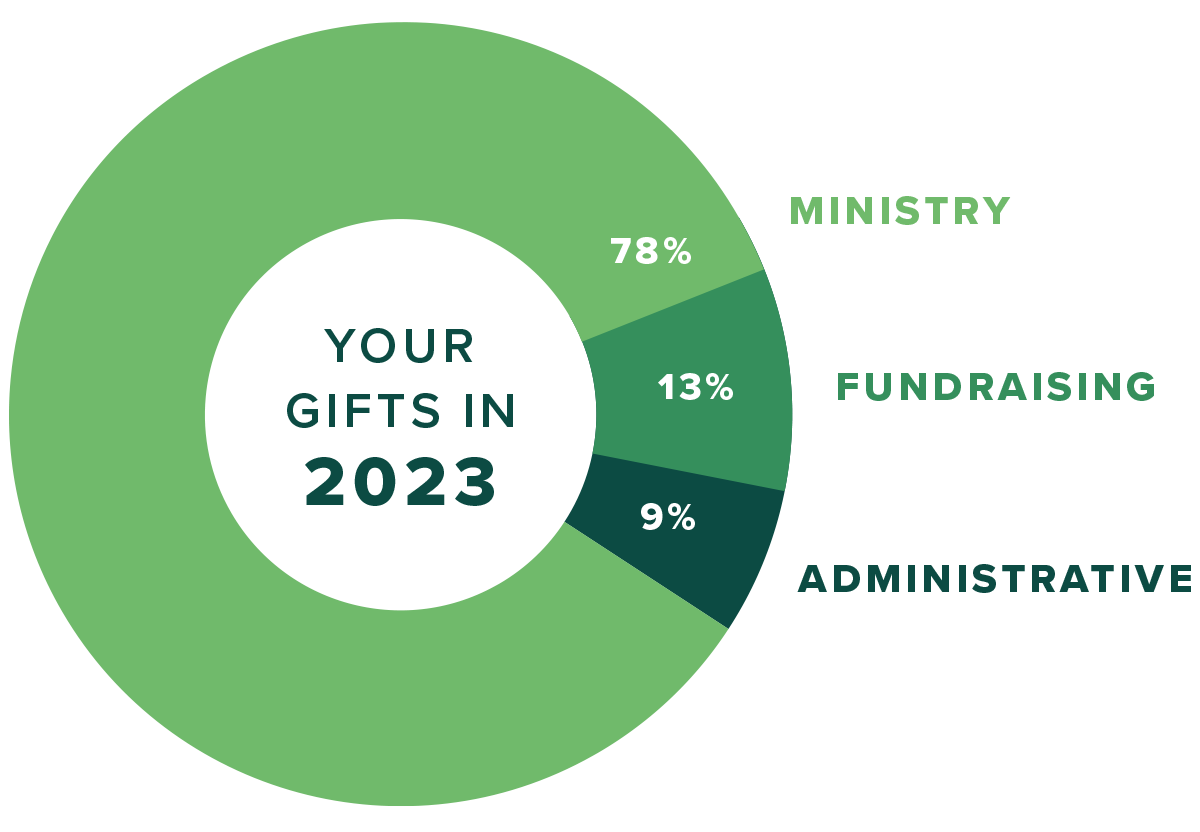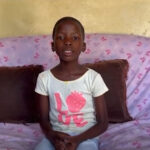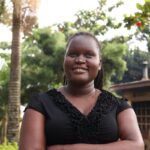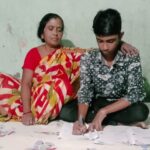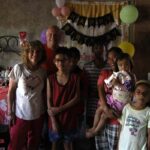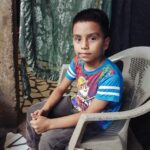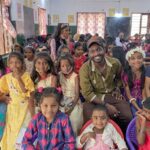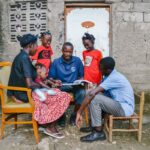Out of a meeting between a U.S. pastor and a bishop in Kenya came a seed — the means to buy more land and build classrooms for kids — so the church could minister more effectively to children living in poverty. Little did they know what a mighty tree would grow.
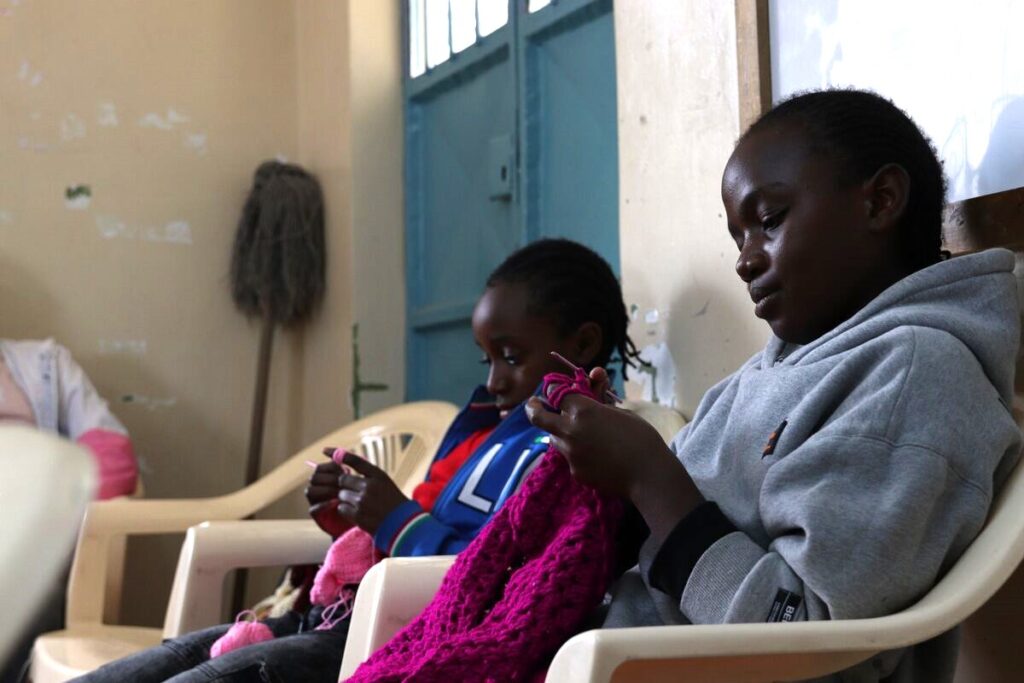
Kids at the Syokimau Hope Center have a chance to learn new skills, such as crocheting.
In 2015, members of Westover Assemblies of God church from the U.S. visited Nairobi, the capital of Kenya.
While there, Pastor Jim Rion met Bishop Paul Munyiri of PEFA Syokimau Church and recognized in the bishop a man who had a deep commitment to his calling and to the kids in his community.
Pastor Jim realized they had a shared vision to help kids living in poverty. And this shared vision would eventually grow into a fruitful partnership that would benefit families and kids in Syokimau in so many ways.
Bishop Munyiri had recently moved from a thriving church in Nairobi to plant a new church in Syokimau, an area on the southeast outskirts of the city. Over his years in ministry, Bishop Munyiri had planted four churches, including the one where he had most recently been ministering in Nairobi.
He says that God had placed in his heart the desire to start the church in Syokimau back in 2009.
Bishop’s Journey in Ministry
Bishop Munyiri’s journey to ministry began 30 years ago when he resigned from being a senior accountant in a leading motor vehicle sales company in the country to attend Bible school for a bachelor’s degree in Bible and theology.
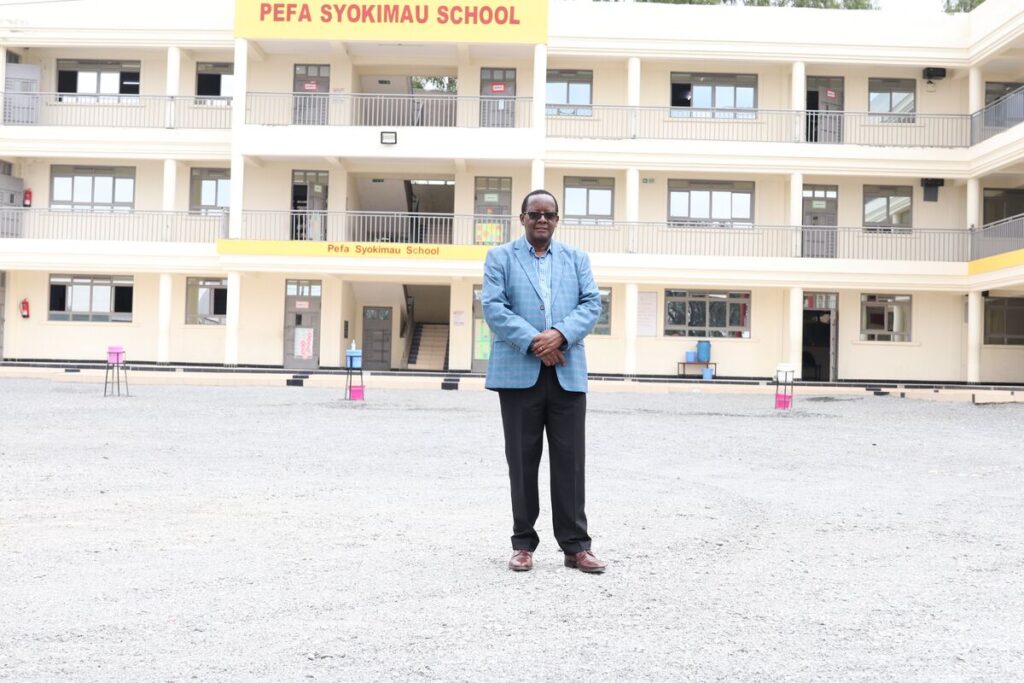
Bishop Munyiri stands in front of the Hope Center and school.
Thereafter he joined the ministry as a pastor and has over the years become a bishop. So, when he began to feel the desire to start a new church, he knew it was time to move.
But apart from planting churches and growing them before leaving, one thing that is common in all the churches he had ministered to is that the children’s ministry flourished.
“I love children and the children’s ministry,” he says. “There was phenomenal growth in the many churches that I pastored in before. The children that were there when the churches were being set up about 20 years ago are now elders in those churches.”
The Move to Syokimau
In preparation for setting up a church in Syokimau, the church in Nairobi did a survey in the area to identify the needs in the community.
From the survey, they gathered that some of the issues in the community included lack of schools, clean water, health care, and security. Of these needs, the church settled on addressing the lack of schools.
The community didn’t have any government schools. It only had a few private schools, which were small and could only host a few kids from the area. The closest government school was over three miles away.
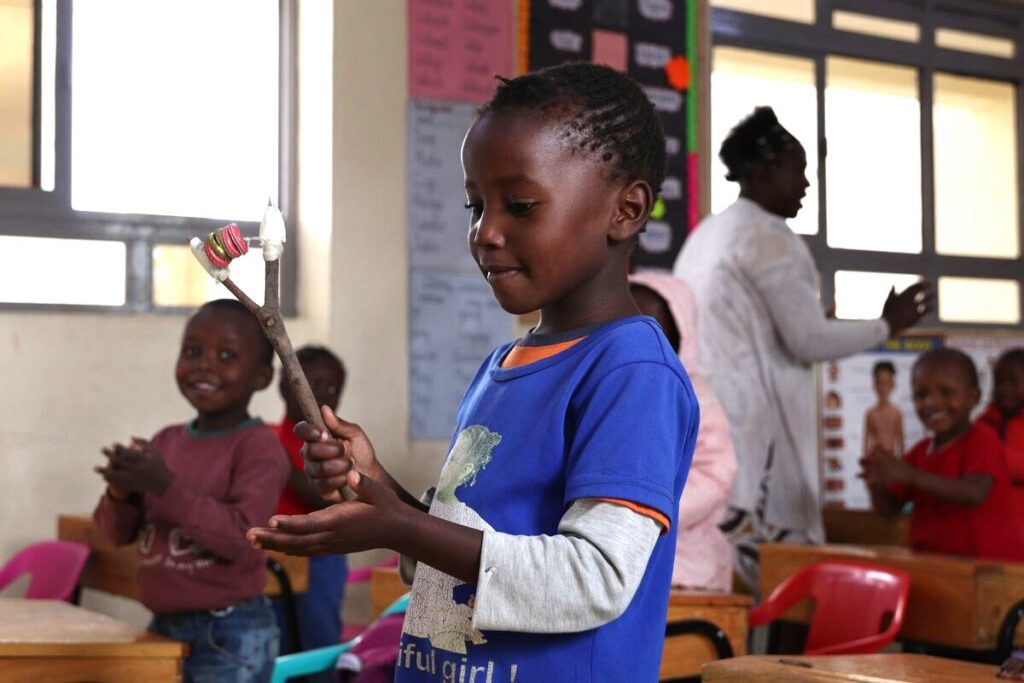
A girl at the Hope Center plays with a homemade hand shaker.
So, from the beginning, the church knew they wanted to set up a school in the church compound.
However, they had only seen the needs of the immediate community around the church, which is made up of middle-class people. From a quick glance at Syokimau, one might imagine the whole community is made up of middle-class people.
Recognizing a Hard Place
But after the church began, Bishop Munyiri says they realized that behind the homes of the middle-class people lay slums filled with families living in poverty.
“We didn’t realize that we had needy people in the community during the survey because we did not go deep into those parts of the community,” he says.
“It is during our time of evangelism that we realized we had the needy in the community living in slums called Kicheko and Kwa Mbemba.”
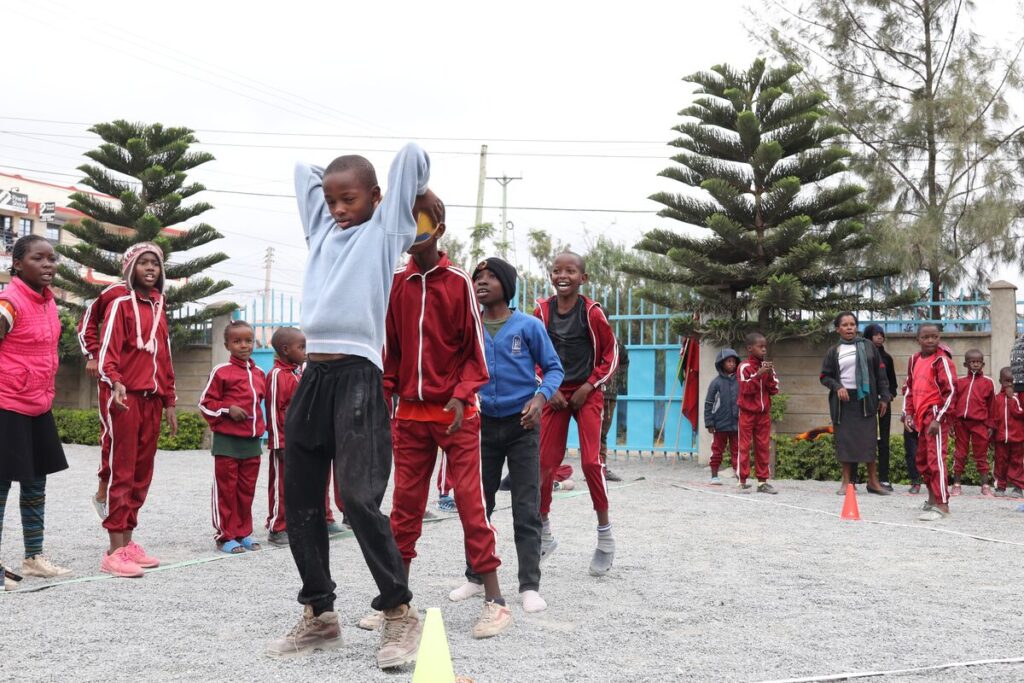
Playing games outside gives kids at the Hope Center some exercise, fresh air, and bonding time.
This realization left Bishop Munyiri with a burden in his heart. He wondered how he would touch the lives of the people living in the slums. As the days went by, Bishop Munyiri says his desire to serve the needy in the community grew and tugged at his heart.
Little did he know that the solution to his desire lay close by.
Getting to Know OneChild
A year after the church began, Bishop Munyiri heard about OneChild.
“I came to know about OneChild from Nicholas, one of the elders in the church,” he recalls. “There are times he would be away from the church from time to time and would later tell me that he was out for work in Turkana and Malindi. And I began to wonder what work he does there.”
Bishop Munyiri learned that Nicholas was the OneChild Kenya Country Director.
From Nicholas, he came to know that OneChild works to serve kids in hard places. So Bishop Munyiri shared with Nicholas his desire to have the Syokimau Church reach out to kids in the surrounding slums.
In May 2015, the Syokimau Hope Center was set up and kids from the poorer areas were registered into the OneChild sponsorship program.
When the church was established, they set up a big tent that served as their base. Then they built a tin structure with rooms that served as church offices and Sunday school classes. They also built modern toilets for the facility.
When the Hope Center opened, the rooms were not big enough for the many kids who wanted to attend, so the church set up a few more tents that were used by the kids as classrooms when they came to the Hope Center on Saturdays for the program.
A Seed Sown
That’s about the time that Pastor Jim of Westover Assemblies church came to visit. After his visit to Syokimau, Pastor Jim donated funds to help the church purchase another piece of land to expand.
“He visited at a time when the church was trying to raise funds to purchase a piece of land. With the kids at the center, we needed space,” Bishop Munyiri recalls.
The church had raised half of what was needed to acquire the land, and on the Sunday that Pastor Jim visited, they had just taken out a loan from a bank for the remaining amount needed.
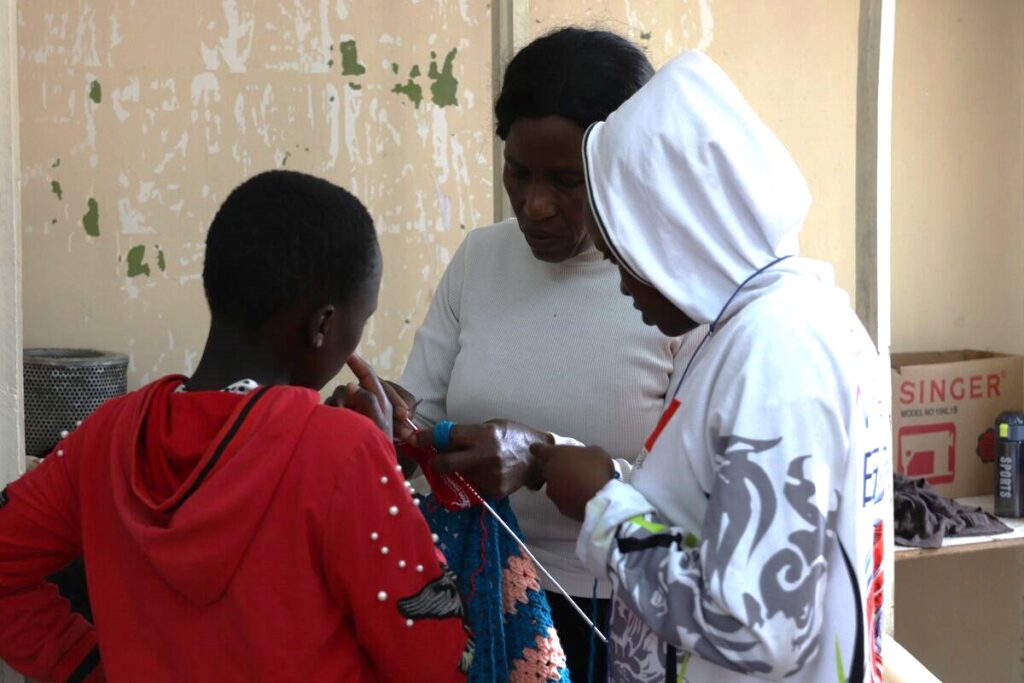
A Child Champion at the Hope Center teaches kids how to crochet.
After meeting with the bishop and hearing his heart and the vision he had for the church, Pastor Jim offered to pay off the loan for the church after he returned to the U.S.
He later followed up and donated funds to build three classrooms. In addition, the contractor who was building the classrooms donated an extra classroom to the church.
In addition to the classrooms being used by the kids at the Hope Center and at Sunday school, they were also being used during the week by kids at the school the church had established in 2017.
Bishop Munyiri believes that Pastor Jim planted a seed that gave the church a boost and spurred on the church’s growth.
“The gift from Pastor Jim helped us gain momentum and we’ve been able to achieve all we have much faster,” says Bishop Munyiri. “It allowed the community to realize that we are a serious church. It also helped us minister better to the kids at the center and in Sunday school. It became a launching pad for all we’ve been able to achieve at the school.”
A Flourishing Ministry to the Community
Currently, the church has over 450 members and cumulatively serves approximately 850 kids at the Hope Center, school, and Sunday school.
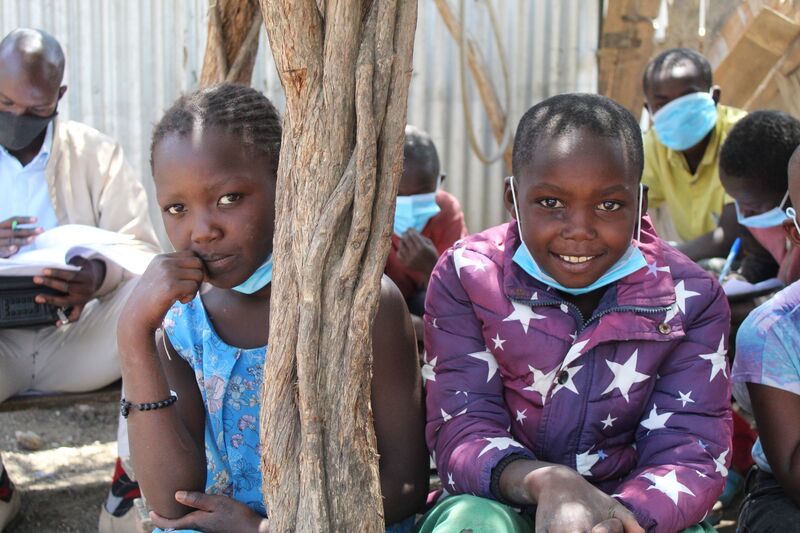
These are among the 850 kids served at the Syokimau Hope Center, church, and Sunday school.
Apart from serving people in the church and the kids, the church has offered employment to approximately 50 people.
“We are grateful to Pastor Jim and the Westover church for giving us that push we needed at that time,” Bishop Munyiri says.
“It goes a long way when you believe in someone and sow a seed of faith in them. That could be the only miracle they need to grow into greatness.”
From the purchase of their first additional piece of land and the construction of permanent classrooms, the church, through the leadership of the bishop, has pulled resources together to purchase even more land and build an ultra-modern building for the school.
Bishop Munyiri says it is important for the kids from the hard places to have a good experience when they come into the Hope Center.
In addition to being received with a lot of love and care by the Child Champions, the children find hope in the ambiance created by the ultra-modern buildings.
“We all love a beautiful place, so imagine what happens to the kids who live in 10-by-10-foot tin houses, with no toilets, no electricity, and poor roads leading to their houses, when they come and experience the ambiance at the church,” he says. “They get to know that there are no impossibilities in the world.”
Bishop Munyiri also believes that it is important for the Body of Christ to be presented in a way that depicts excellence.
“From the creation story in Genesis, I think our God is a God of excellence. He is a great planner with purpose and objectivity, so whatever He does, He does it nicely, and I want to believe he would like for his people to emulate him,” Bishop Munyiri says.
“But if we don’t do things excellently, people look at us and wonder how we can talk about heaven that we haven’t been to, yet socially and in the world, we seem not to have direction. People get so confused when we speak highly about salvation and God, yet there’s a lot of contradiction from how we represent Him.”
His hope and prayer for the kids that the church ministers to is that they can have big dreams about who they want to become and what they can achieve in life.
He also hopes that from the blessings they have received from all their Child Champions, they can be a blessing to others around the community and slowly change the hard places by spreading God’s love.
Help us reach more kids in hard places like Syokimau by giving to the OneChild Partners Fund!
We are accountable to the children we serve AND to our donors.
Our accountability to our donors is one of our highest priorities. Our goal is to use the funds entrusted to us as wise stewards. To do this requires continued monitoring of our fund distribution. OneChild is also a member in good standing with the Evangelical Council for Financial Accountability (ECFA)
